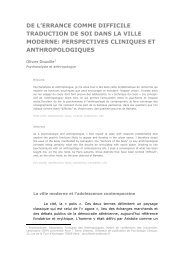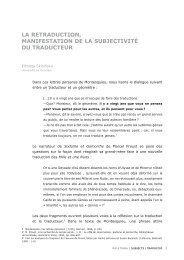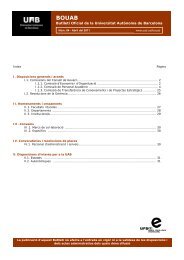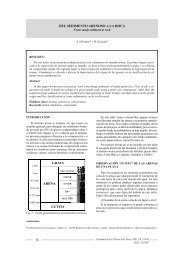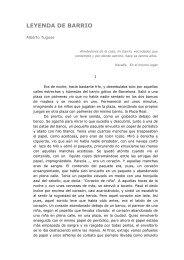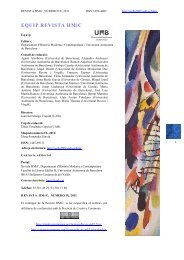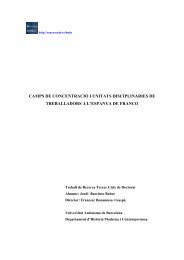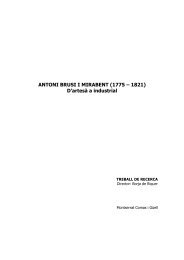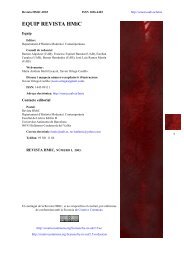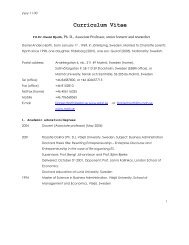EQUIP REVISTA HMiC - Universitat Autònoma de Barcelona
EQUIP REVISTA HMiC - Universitat Autònoma de Barcelona
EQUIP REVISTA HMiC - Universitat Autònoma de Barcelona
Create successful ePaper yourself
Turn your PDF publications into a flip-book with our unique Google optimized e-Paper software.
Marginalization Insi<strong>de</strong>-Out:Thoughts on Contemporary Chinese and Sinophone Literature<br />
canonization discourse is effectively produced by Western critics and aca<strong>de</strong>mics who establish<br />
hierarchies according to imperialist principles, which try to justify the <strong>de</strong>-centered position of<br />
Chinese literature by presumptuously consi<strong>de</strong>ring it to be inferior, un<strong>de</strong>r<strong>de</strong>veloped or<br />
unsophisticated. 24 This process is usually unconscious, as we have seen in the Jameson’s<br />
example, and this is what makes it more dangerous and difficult to confront.<br />
Chinese literature, then, gets trapped by its own consi<strong>de</strong>ration as a minority, third world<br />
literature: “While the ‘world’ significance of mo<strong>de</strong>rn Chinese literature <strong>de</strong>rives from its status<br />
as minority discourse, it is precisely this minority status that makes it so difficult for mo<strong>de</strong>rn<br />
Chinese literature to be legitimized as ‘world’ literature (...).” 25 In other words, we could argue<br />
that the representation of contemporary Chinese literature in the West is a victim of restricted<br />
cross-cultural transference politics. Only the texts with particular appeal to the Western canon<br />
will be valorized, whereas the rest will remain unnoticed. This situation can easily lead to what<br />
Chen Xiaomei <strong>de</strong>fines as cross-cultural “misun<strong>de</strong>rstandings”: “a view of a text or a cultural<br />
event by a ‘receiver’ community that differs in important ways from the view of that same<br />
phenomenon in the community of its origins.” 26 These misun<strong>de</strong>rstandings, I would argue,<br />
always reinforce the minority status of Chinese literature. Taking, for instance, the ways in<br />
which many Chinese literary works choose to move towards mo<strong>de</strong>rnity (in terms of style and<br />
thematic, for instance), we find that they match perfectly with what the Western canon consi<strong>de</strong>rs<br />
to be a thematic sign of minority discourse: “In its investment in suffering, in social oppression,<br />
and in the victimization and silencing of the unprivileged, mo<strong>de</strong>rn Chinese literature partakes<br />
of the many issues of ‘minority discourse’ that surface with urgency in the field of cultural<br />
studies/cultural criticism in North America [and in the West in general] today.” 27<br />
Echoing Gadamer, Howard Goldblatt has also analyzed the differences between the Chinese<br />
authors’ and rea<strong>de</strong>rs’ horizons on the one hand, and the international rea<strong>de</strong>rs’ horizons on the<br />
other hand. Goldblatt points out how Western expectations have been fulfilled by the contents<br />
of certain contemporary Chinese novels that were produced in other terms, creating then crosscultural<br />
misun<strong>de</strong>rstandings:<br />
21. Shih, “Global Literature and the Technologies of Recognition,” 17. Her reference to the West and the<br />
rest echoes Stuart Hall’s remark in Hall, Stuart, “The Rest and the West: Discourse and Power,” in Hall,<br />
Stuart and Gieben, Bram, eds., Formations of Mo<strong>de</strong>rnity. London: Polity Press, 1992, 275–332. Among<br />
many possible technologies of recognition that affect Chinese literature, Shih selects the aca<strong>de</strong>mic<br />
discourse and the literary market as representative in terms of consistency and complexity. In the next<br />
sections we will basically remain on the same focus.<br />
22. Shih, “Global Literature and the Technologies of Recognition,” 27. Her reference to Ahmed is from:<br />
Ahmed, Sara, Strange Encounters: Embodied Others in Postcoloniality. London: Routledge, 2000.<br />
23. Chow, Writing Diaspora, 123.<br />
24. The Nobel Prize, for instance, would be one of these technologies that, instead of raising the status of<br />
minority literatures—by “letting them speak”—uses a tokenistic process, by which the Western canon<br />
tries to justify its false plurality. For an analysis of the relation of the Nobel Prize and contemporary<br />
Chinese literature prior to the concession to Gao Xingjian in 2000, see Larson, Wendy and Kraus,<br />
Richard, “China’s Writers, the Nobel Prize, and the International Politics of Literature,” in The<br />
Australian Journal of Chinese Affairs, no. 21 (January 1989): 143 – 160. See also: Lovell, Julia, “Gao<br />
Xingjian, the Nobel Prize and Chinese Intellectuals: Notes on the Aftermath of the Nobel Prize 2000,”<br />
in Mo<strong>de</strong>rn Chinese Literature and Culture, vol. 14, no. 2 (2002): 1-50.<br />
25. Chow, Writing Diaspora, 101.<br />
26. Chen, Xiaomei, Occi<strong>de</strong>ntalism: A Theory of Counter-Discourse in Post-Mao China. Oxford & New<br />
York: Oxford University Press, 1995, 96.<br />
http://seneca.uab.es/hmic Revista <strong>HMiC</strong>, número IV, 2006<br />
46



